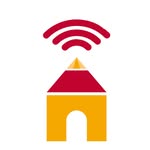
We Skoolhouse
Home and classroom program for ages pre-birth to six. Grab your FREE TRIAL at weskoolhouse.com
Recent Posts

The Secret is OUT... YES! You CAN open your own childcare center! The We Skoolhouse Ultimate School Guide (USG) is designed for those looking to start or build upon a thriving childcare center. Our comprehensive guide provides expert strategies and support for every step of the journey, including: * Safety & Functionality within the Facility * Permitting and Compliance * Staff and Supervision * School Operations * Branding and Marketing * Designing your Center The guide includes 20+ templates & tools (over $110 in value): * Site Evaluation Model: Financial model designed to help you estimate your start-up costs * Example Supply Lists: Including classroom furniture, toys, and books (grouped by age). * Templates: School operations, communication, and organization. * Recorded webinar: Introducing all concepts of the We Skoolhouse Ultimate Guide Get inspired & grab your copy of the WE SKOOLHOUSE USG TODAY: LINK IN BIO (WSH Ultimate School Guide 📄)
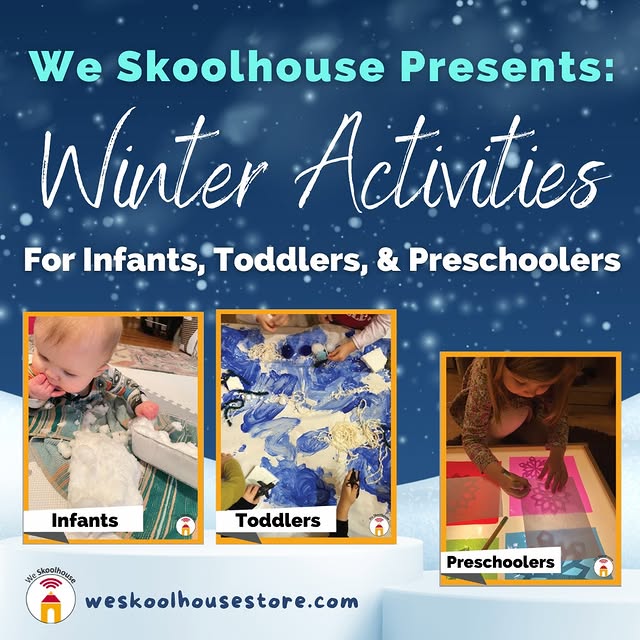
Embrace the season of winter with our hands-on, sensory-rich, & developmentally appropriate activities for infants, toddlers, and preschoolers (ages 0-6 years old). ❄️ No crafts & no coloring sheets - just open-ended, child-centered learning done right! 🙌 Each Packet includes: - Seasonal vocabulary words, songs, & suggested books - 12+ easy-to-set-up suggested activities & experiences to embrace in the classroom or home Access our Winter Packets in 2 ways: 1. weskoolhouse.com : Create an account and get these packets (PLUS ALL of our other documents & previously recorded webinars) via monthly subscription. 2. weskoolhousestore.com : Purchase activity packets & documents a la carte! For activities, we strongly suggest to go slow and revisit, revisit, revisit! Remember, young children require repetition of experiences to strengthen neural connections, deepen understanding, build confidence, enhance skill mastery, and foster long-term memory - that's why we're offering 12 quality-driven, open-ended experiences, versus low quality, quantity-driven crafts, worksheets, and coloring sheets.
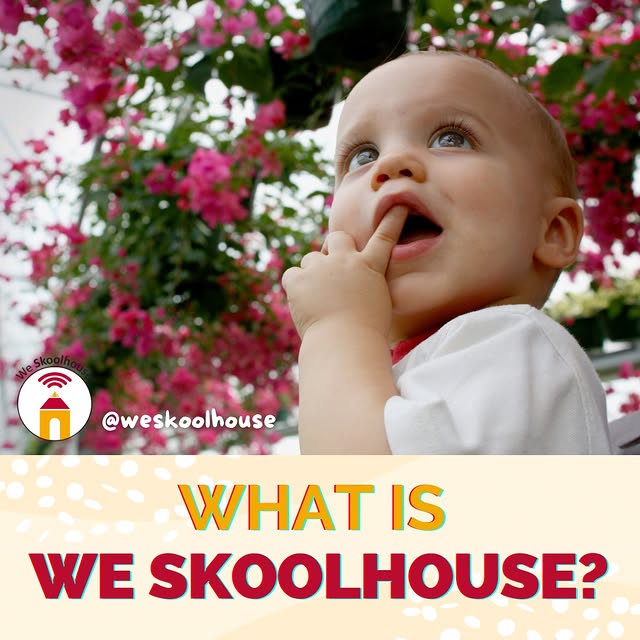
It's time to take back early childhood! Are you in? When we look at early childhood, whether in the classroom or at home, there has been a significant decline in developmentally appropriate practices. We're "schoolifying" children who aren't even school-aged, prioritizing left-brain learning at the expense of healthy, holistic development—particularly in social-emotional growth and creative thinking. We're pressured to bombard children with worksheets, new activities, and "educational" apps daily—methods that actually contradict how children naturally learn best. It's clear that the mental and physical health of our children is declining rapidly. It's time to restore and preserve childhood. Are you ready to make a change? The good news is, our program We Skoolhouse is here to help. We're a resource hub for teachers and parents who want to implement developmentally appropriate practices and deeply understand the why and how behind best practices in early childhood. Together, we can support children's healthy development and bring childhood back to what it needs to be! Learn more about our mission and philosophy by visiting weskoolhouse.com while grabbing your FREE TRIAL! Here's to early childhood done right! 🙌

"Children will force you (or not) to pull your socks up!" 🙌 How do you weigh in on this concept? 🤔
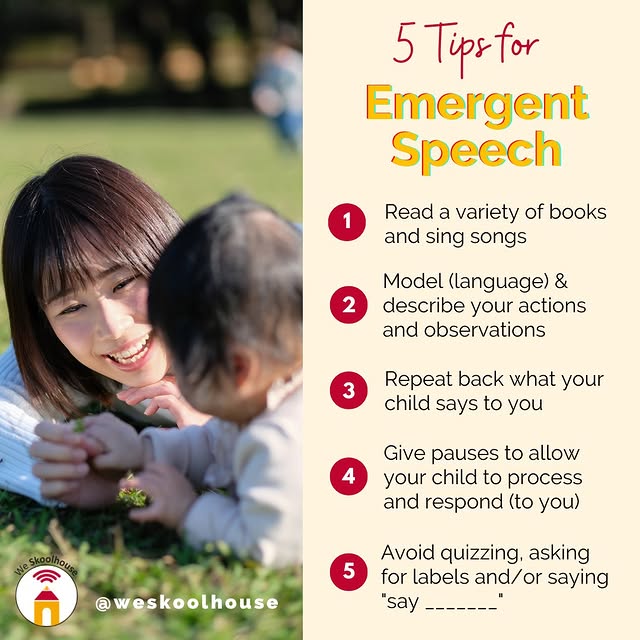
Did you know much of what you already do is perfect enough to support your little one's emergent speech? Learning happens when context is relevant, meaningful, and engaging - and this is particularly true for speech development, too! Simply talking to your child as you go, sharing your actions, observations and feelings, reading books, and singing songs are literally the best approaches we can take to support emergent language. Try your best to avoid quizzing and/or prompting your child to label things. This is an unnatural approach to speech, as we really don't walk around quizzing people. Plus, it can really make children feel uncomfortable and pressured, where we want to keep these experiences as relaxed and inviting as possible. Learn more about communication in our next webinar: Foundations for Literacy in Early Childhood, on Wednesday, December 18th (12:00pm EST) We're diving into: - Where the journey to literacy begins - How to prepare for reading and writing - Differentiated practice to support all learners Register for FREE: Link in bio Register with Certification: https://www.weskoolhousestore.com/product-page/foundations-for-literacy-in-early-childhood

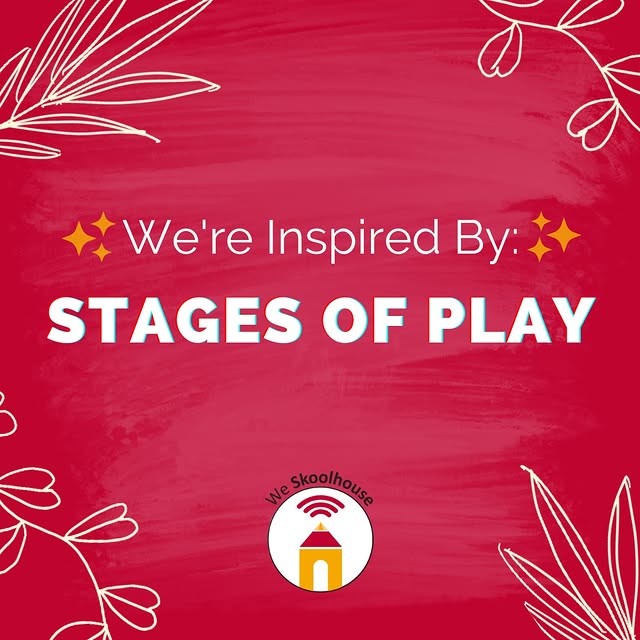
We're often asked about what socialization and play should look like for children ages 0-6, so let's jump on in! Play in the early years does not require as much social interaction as we may often think. For example, you may bring your toddler or young child to the park or to a music class, for example, and become concerned if they're not showing much interest in their peers. Good news is that this is totally developmentally appropriate! Much of the child's first few years of life is really about experimentation, observations, and discovery. Babies, toddlers, and children want to get their hands and bodies on seemingly anything and everything to construct knowledge of the world around them. As they get older and connections in the brain solidify, they will begin branching out more-and-more, collaborating with peers for more organized and purposeful play. Not only will age influence your child's stage of play - but so will their personality. You can have two children who are the same age, however, they may be in different stages of play based upon their unique approaches to learning. That does not suggest one stage of play is better or worse than the other, but rather, they're simply different. We have this document and so many more that discuss play and developmentally appropriate practice in early childhood on our platform (for teachers & parents)! Simply visit weskoolhouse.com to access all of our resources by clicking "Free Trial" and choosing between the Home or Classroom model! Happy exploring!
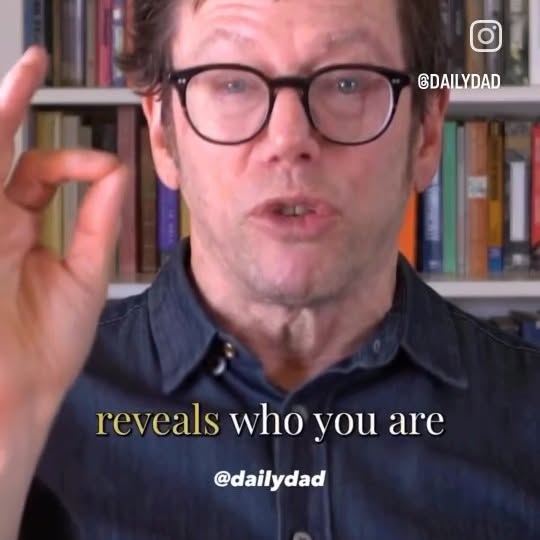
Actions always speak louder than words, and what we model to our children will teach them exponentially more than any verbal lesson will.
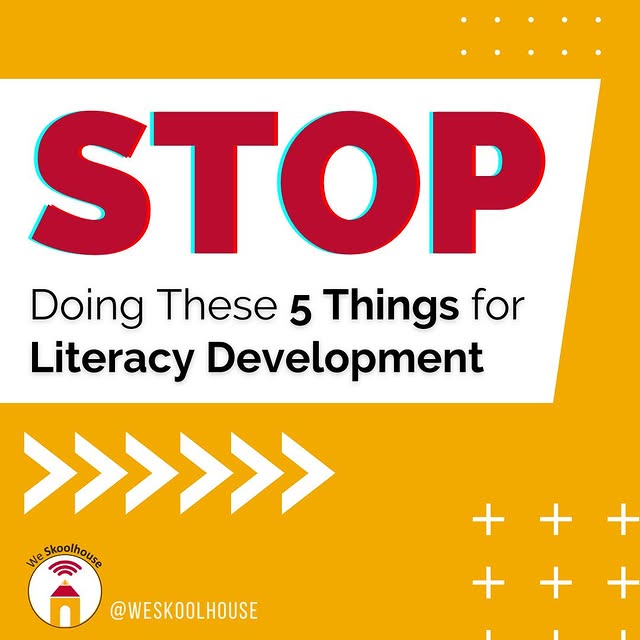
Rushing children to read and write early doesn’t work — in fact, it hinders development. No, children who memorize their ABCs do not necessarily understand letters or their corresponding sounds. No, children who read or write sooner do not have any academic advantage over those who begin reading and writing later. In reality, the opposite is true. Children who engage in more child-led, play-based experiences—where play is self-directed and not controlled or corrected by adults—have higher academic outcomes in the future. Now, don't get us wrong - It’s important to support children who show an intrinsic motivation to read and write, especially if they’re doing so earlier than the average age. However, there’s a key difference between fostering this natural curiosity and pressuring a child to perform beyond their developmental stage. Pushing for comprehension or writing skills before they are ready can lead to frustration and disengagement. Instead, follow your child’s unique pace and interests, not (unrealistic) external expectations. Dive deeper into the topic in our next webinar: Foundations for Literacy in Early Childhood, on Wednesday, December 18th (12:00pm EST) We're diving into: - Where the journey to literacy begins - How to prepare for reading and writing - Differentiated practice to support all learners Register for FREE: Link in bio! Register with Certification: https://www.weskoolhousestore.com/product-page/foundations-for-literacy-in-early-childhood This is a recorded session! Everyone who signs up will receive a copy of the webinar after it airs!
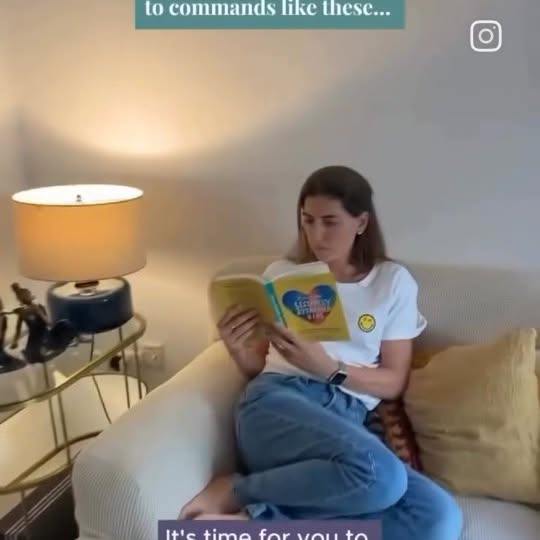
What if we can achieve the same (if not better) outcome if we tweak and revise our approach? Reflection is always a powerful tool for growth - in any and all areas of our life. Sometimes as adults, we may speak to our children in a way that is more harsh than we would talk to our peers, spouses, and co-workers, but don't our children deserve that same level of respect? That's not suggesting we budge on our boundaries, but rather, we approach the boundaries and expectations in a way that elicits connection, leading to greater cooperation - versus the good old fashioned power struggles that create more tension and separation. Little tweaks like this can be a gamechanger. Have you tried an approach like this? How did it work out for you and your children?
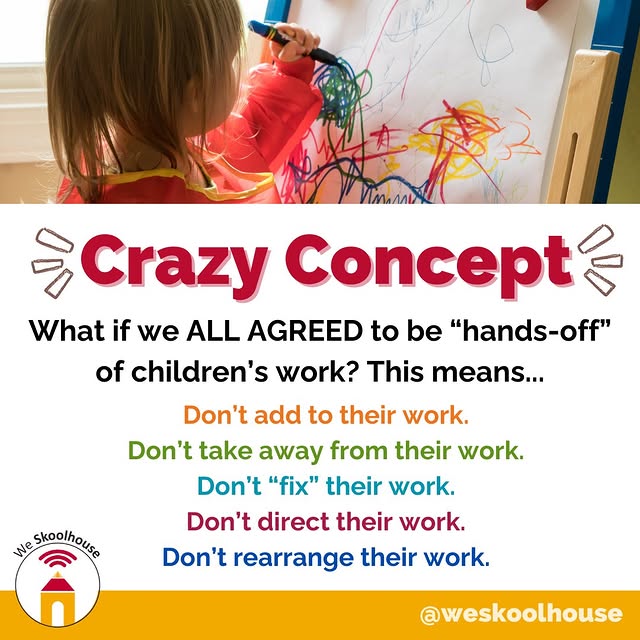
Adults have more to learn about learning than children do. Whether a toddler or teenager, there is never any benefit of an adult stepping in and doing the work for a child. This does NOT suggest we aren't present to GUIDE AND SUPPORT children in their learning journey - a very critical role of the adult. But stepping in and doing for your child, particularly to achieve a desired outcome does more harm than perhaps realized. Doing the work for children will: Rob them of confidence and make them feel like their efforts are not good enough. Rewire their brain from learning HOW to learn, to then focusing on WHAT to learn. Reduce critical and creative thinking which are immeasurable skill sets that can only flourish by thinking and doing. Limit their adversity to make and recover from mistakes or consequences. Provide a false sense that someone else is responsible or will always be there to fix their challenges for them, which can lead to an inability to cope and navigate other challenges and set-backs later down the line. Will become more extrinsically motivated, seeking external praise and approval for a desired outcome, over intrinsic motivation and effort. Again, guide children as needed, but more importantly learn how to step back and allow their learning process to unfold and grow. For more GUIDANCE ON HOW TO GUIDE, get our PROCESS-DRIVEN LEARNING BUNDLE for 40% OFF! Valued at $24.95 for only $14.97. Act fast - Sale ends January 1st! The Learning bundle includes these 5 in-depth documents (for the price of 3!): - Limit Crafts and Worksheets - Provocations - The Power of Play - The Importance of Repetition - Winter Activity Packet for Preschoolers https://www.weskoolhousestore.com/product-page/process-driven-learning-bundle-40-off-limited-time-only
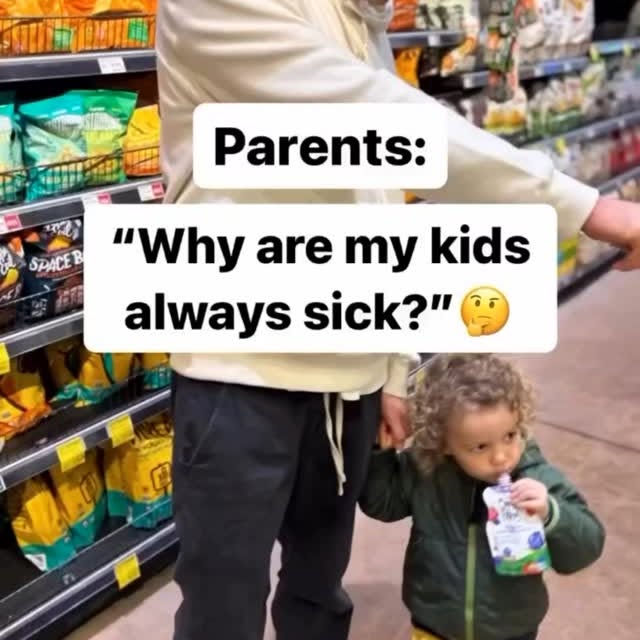
This winter season (and all year long), remember the importance of checking ingredients on products that go onto and into your children's bodies. If you're finding that products have a laundry list of ingredients, it's probably not good news. Look up ingredients if not sure what they are to help make your decisions. Think beyond the marketing, meaning a product can call themselves anything, name themselves "healthy harvest," for example, but there may be nothing actually healthy about the product. Juice is another sneaky one; a juice can say 100% natural with no sugar added, however, since juice is pasteurized its cooked at a high heat which removes all the fiber, vitamins, and minerals, leaving it to be primarily fructose which is quite taxing on the liver and insulin levels - so try to avoid it. However, fresh squeezed or cold pressed juices are much better, healthier options to opt for. Unfortunately, many products are made with harmful chemicals and additives that cause high levels of inflammation, hinder the microbiome, spike insulin and negatively effect metabolic and mental health (via the gut brain axis), and so much more. Reducing and eliminating the toxins can and will make a world of difference in overall health for our children - and their adults too. 😉
Similar Influencers

Food Storage & Emergency Preparedness ➖Brittany Jones

survival || camping || wild

The Lost Super Foods Book

Grid Down Prepping

Dr. Joel Gator Warsh

Dr. Simran Jain Rangnekar

Ketaily Technical Consulting

CNET

Shahzad Kayani

No Grid Survival Projects

Shane Luckey


RaphaCure

Green Planet Restoration

Gautampuri Badarpur

Life Saving First Aid

Aeroo Shield

Campak Gear

Armando Pantoja

Yahya Kaludi | Civil By Yahya Sir

Canyons, CPR and First Aid

annie | off-grid homesteading

The FreeThoughtProjectPodcast

Housewife Prepper

Camplife Customs

Truth About Chemtrails

Zani Sunshine | Offgrid Planning Expert

Survival | Off-The-Grid | Bushcraft

Muster Dogs
